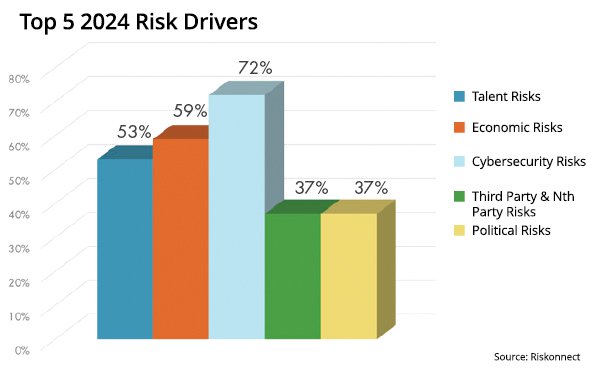
Artificial intelligence (AI) may have many
beneficial uses. It also poses risks, as companies are discovering to their chagrin.
A shocking 72% of firms say cybersecurity risks are having a severe impact on
their organization — up from 47% in 2023, according to The 2024 New Generation of Risk Report, a study by Riskonnect.
Moreover, 24% said ransomware,
phishing, deepfakes and other AI-driven cyber threats will have the greatest impact on their businesses over the next 12 months.
Yet 80% of companies lack a
dedicated plan to address generative AI risks, including AI-drive fraud attacks, the study says. And 65% of firms do not have a policy to govern the use of generative AI by partners and
suppliers.
advertisement
advertisement
But cyber threats are not the only problem. Fifty-nine percent of companies also cite economic risks, up from 49% in 2023.
For context, the study offers this historical reminder. “Think about the advent of email,” the study states. “Organizations ultimately needed to create policies
around its use. These policies specified that employees shouldn’t put sensitive information in email and should understand emails are archived, searchable, and legally discoverable. As
generative AI adoption grows and more departments consider leveraging these tools, the same type of policies and guidelines need to be in place.
There is one sign of hope —
that the “strategic use of AI in risk management can enhance the risk management team’s efficiency and performance.”
How does
this happen? “By automating routine tasks and providing advanced analytical capabilities, AI enables risk management professionals to focus on higher-value activities and strategic
decision-making. “
Here are the top use cases for AI in risk management:
- Risk forecasting — 30%
- Assessing risks — 29%
- Scenario planning and simulations — 27%
- Monitoring threats — 25%
- Identifying new
risks — 22%
- Detecting fraudulent transaction and activities — 21%
- Creating risk registers — 20%
- Third-party
assessments — 18%
- Analyzing behavioral and accident patterns to improve workplace safety — 17%
- Creating business continuity plans —
15%
- Streamlining claims management — 13%
Riskonnect surveyed 228 risk and compliance professionals.